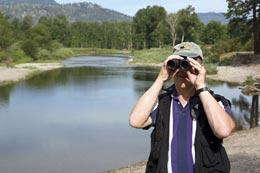
3 minute read
OUR POINT OF VIEW Time to Broaden Our Base
Time to broaden our base
Having now spent 11 years as director of Montana Fish, Wildlife & Parks, the single biggest issue I see facing this department is the need for additional sustainable funding sources to help us manage Montana’s remarkable bounty of fish and wildlife species and their habitats.
Over the past century, almost all the fish and wildlife conservation work done by FWP has been paid for by hunters and anglers. That funding comes from hunting and fishing license sales, as well as a federal excise tax on guns, ammo, rods, reels, and other sporting gear. With that money, FWP and its partners have restored elk, bighorn sheep, and pronghorn populations; helped protect streams and rivers; and created some of the nation’s best hunting and fishing opportunities.
Our focus has primarily been Montana’s roughly 80 fish and wildlife game species—those that can be harvested. Yet our state is also home to another 550 species of fish, mammals, birds, amphibians, and reptiles. Many of these species require management too, for several reasons: It’s FWP’s responsibility to manage all fish and wildlife species, not just those pursued with rod, bow, or gun. We are legally required to manage federally threatened or endangered species like the bull trout, pallid sturgeon, grizzly bear, and Canada lynx. We need basic knowledge of species of concern like the Sprague’s pipit in order to conserve them and keep them from becoming federally listed. A growing number of Montanans are asking that we pay attention to species like common loons, long-billed curlews, blue suckers, and flammulated owls.
For decades, many nongame wildlife species have benefited from work to conserve game species. Freezeout Lake Wildlife Management Area, for instance, provides habitat for two dozen shorebird species in addition to the multitudes of waterfowl that frequent that area. Work to protect trout streams provides homes and food for mink, muskrats, otters, kingfishers, and osprey.
Hunters and anglers have funded most of this work, as well as most management costs for gray wolves, grizzly bears, and other federally listed species. It’s no longer feasible to expect them to shoulder so much of the burden. Hunter and angler numbers remain steady in Montana, but the need to manage additional species continues to grow. What’s more, many people who don’t hunt and fish benefit from license-funded conservation and services. Inner-
tubers use fishing access sites for free, birders pay nothing to visit Freezeout Lake WMA, and tourists enjoy, at no charge, the grizzlies, elk, bighorn sheep, and clean rivers that Montana sportsmen and sportswomen helped restore and manage. The good news is that many Montanans and tourists want to help pay for fish and wildlife conservation. FWP and others in Montana’s conservation community are looking for ways to make that happen. Over the past year, a diverse citizen’s group called Finding Common Ground met to discuss the feasibility of broadening Montana’s fish and wildlife conservation funding base. On a national level, the Blue Ribbon Panel on Sustaining Am- erica’s Diverse Fish and Wildlife Resources is exploring federal funding options. The panel includes Bass Pro Shops founder John L. Morris, former Wyoming Governor Dave Freudenthal, and Watching birds along the Clark Fork River. Birders and others should have opportuconservation interests like the Cornell Laboratory of Ornitholnities to contribute to fish ogy. The group may soon propose and wildlife management. that Congress authorize using part of the money now going into the U.S. Treasury from federal offshore oil and gas leases to provide matching grants to states for more broad-based wildlife conservation. Under current proposals, Montana could receive up to $22 million per year. That would be great news, except that we’d still have to come up with matching state money, so we’ll need a state source other than what hunters and anglers pay FWP. Striving to broaden our funding base in no way means we will do less for game species or abandon hunters and anglers. FWP strongly values and supports the longtime and continued importance of hunting and fishing to Montana’s culture, economy, and conservation ethic. We’re not leaving anyone behind, especially “them that brought us here.” We’re simply, out of necessity, welcoming more conservation participants—and payers—into the tent. It’s either that or watch our state fall further and further behind on our responsibilities to manage all the fish and wildlife that contribute to the Montana experience.
We’re simply, out of necessity, welcoming more participants— and payers— into the tent.”
—M. Jeff Hagener, Montana Fish, Wildlife & Parks Director







